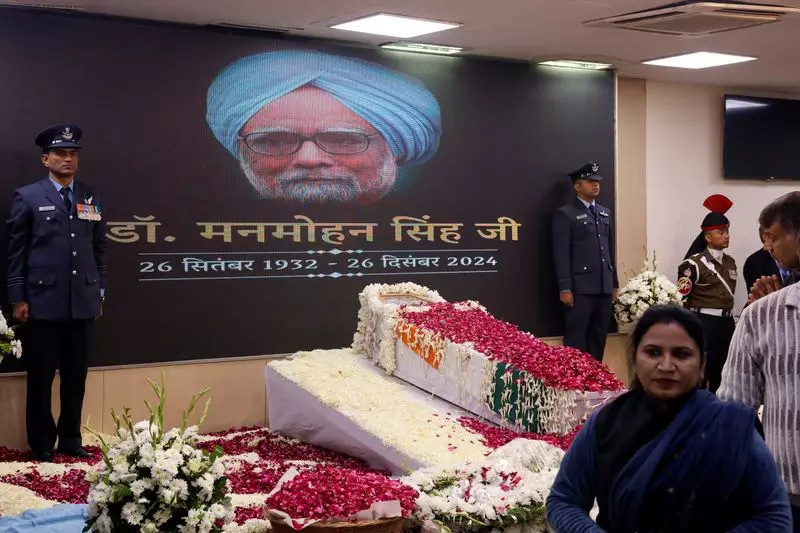Former Prime Minister Manmohan Singh, who passed away at the age of 92, was cremated on the banks of the Yamuna River in New Delhi, an event that drew significant attention both domestically and internationally. The ceremonial farewell, steeped in Sikh tradition, saw his body being transported on a flower-adorned carriage, reflecting the deep respect and love the nation had for him. Politicians and citizens alike came together to honor his contributions, embodying a spirit of unity in grief. The ceremony was characterized by solemnity and reverence, showcasing the depth of loss felt by the Indian populace.
The Indian government ensured that Singh’s funeral was conducted with full state honors, highlighting the importance of his role in shaping modern India. Draped in the tricolor flag, Singh’s body was a poignant symbol of his dedication to the nation. The tribute involved Sikh priests chanting hymns, which added a personal touch to the proceedings, connecting Singh’s spiritual beliefs with the public outpouring of respect. The decision to allocate land for his memorial further cements Singh’s place in history, allowing future generations to remember the leader who played a pivotal role in India’s economic transformation.
Singh’s tenure as Prime Minister from 2004 to 2014 was both celebrated and criticized, a duality that underpins his complicated legacy. He is recognized as the architect of India’s economic liberalization, a period that saw tremendous growth and opportunities for many. Yet, the latter part of his leadership was marred by allegations of weakness and corruption within his coalition government, culminating in a significant electoral defeat that brought Narendra Modi to power. Singh’s assertion that “history will be kinder to me than the contemporary media” echoes the dismissive attitude he experienced from critics during his leadership. This perspective prompts a reevaluation of his contributions and challenges, especially in light of the political climate that followed his resignation.
Singh’s influence extended beyond India’s borders, attracting the admiration of global leaders who recognized his efforts to forge international relationships and promote India on the world stage. Expressions of condolence from political figures worldwide—including leaders from countries such as the U.S., Canada, and China—assert his significance in promoting global dialogue and economic cooperation. These tributes serve as a reminder that while Singh faced criticism at home, his impact resonated internationally, marking him as a distinguished statesman.
The personal side of Singh’s life, marked by his enduring commitment to family, is also worth noting. He is survived by his wife and three daughters, who have witnessed both the public adoration and the trials associated with his political life. Seeing family members participate in the funeral procession, alongside prominent figures like Congress Leader Rahul Gandhi, underscores the interconnectedness of Singh’s legacy with the political fabric of India. As discussions on his contributions and leadership traits continue, it is clear that Manmohan Singh’s influence on Indian politics and economics will be a focal point for years to come.

